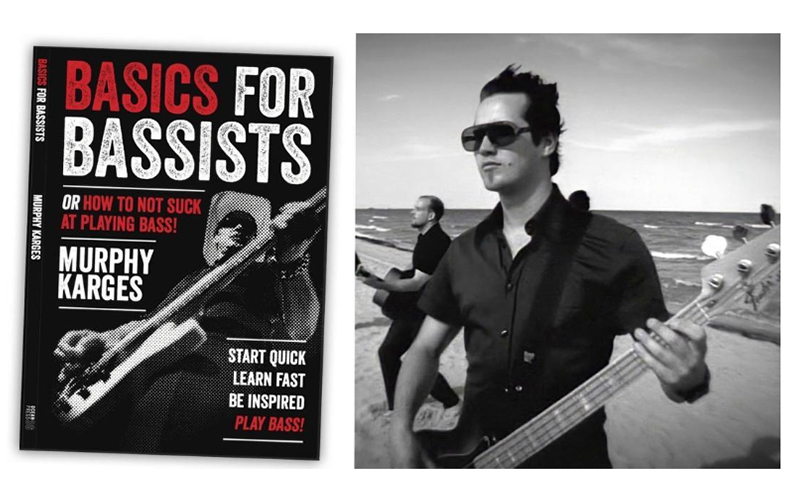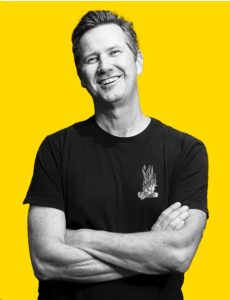 By Simone Goldstone | NB Indy Soundcheck Columnist
By Simone Goldstone | NB Indy Soundcheck Columnist
When Newport Beach resident Murphy Karges, a founding member of the band Sugar Ray, sat down to write his memoir, something unexpected happened.
Instead of chronicling the unfathomable highs of stardom, the lows of lonesome nights on tour away from family, and the tell-all of being in a successful 1990s rock band, he found the love of music and his instrument cutting through that.
“When I was writing my book, I wasn’t thinking ‘this has to be good.’ I was thinking ‘this has to be helpful.’ That’s most important—don’t focus on being good, focus on being helpful,” Karges says, having now penned a book that will help future bassists and musicians for decades to come.
“Basics for Bassists: or How Not to Suck at Playing the Bass” is one quarter toolbox, one quarter tales of being a rockstar, and half how to believe in yourself, appreciate music, and overcome fear.
Funny, informative, and jam-packed with bass tips from a great player, it’s essential for every musician.
It takes a special kind of person to play the bass. Someone that doesn’t care too much for the spotlight and leaves space for other instruments to be heard. Someone that is invaluable, content to keep the rhythm, who isn’t in it for fame or fortune, but for the love of music.
Murphy Karges is one of those rare musicians.
I spoke to the former Sugar Ray bassist about his book, his bass style while in Sugar Ray, and some of the highs and lows of being in the band.

NB Indy: What part of your book are you most excited for people to read?
Karges: I had a lot of fun writing the fourth phase of the book which, after all the technical parts and diagrams, was all the other stuff. Confidence, and playing live, and DIY songwriting and sharing yourself. Understanding the importance of people. People should read “be a music fan” first. It has nothing to do with notes or scale but being a huge music fan is the most important thing you can do. It’s not about tabs or perfect pitch, it’s about being a huge fan. Look at the Beatles, look at Taylor Swift- she’s probably a monster fan of Carole King. The Beatles were huge fans of Buddy Holly. If you listen to a lot of good music and become a huge music fan, that’s where it all comes from.
NB Indy: How did you find your bass style in Sugar Ray?
Karges: When I play bass, I like forming a really solid connection with the drums and really riffy stuff, like the stuff that was in the 90s. We grew up on AC/DC and the Beastie Boys and Hip Hop was coming up, and I liked the Sex Pistols and the Ramones. I did a lot of big riffy stuff. That’s what we did back then. I wrote a lot for our band. I had all these ideas and wasn’t afraid to say them. That’s all there is to being a writer—you just gotta have the guts to put it out there and not be afraid of laughter or rejection. You have to not give a crap. That’s gonna be really healthy for you. And for my style of heavy, riffy, to me it was something in the realm of hard rocking riffs meets funny or bizarre lyrics, and then it changed, but that’s how it got going.
NB Indy: What were some of the highs and lows of your time in the band?
Karges: The highs were definitely having the original guys stay together for so long, and having that pay off by having the record label hand us gold albums after selling so many records. Being a musician you have to give up a lot of stuff. But what’s cool is that you can look back at your family and see the stuff you gave them. Also touring, and meeting people around the world. I’ve played golf in England, been to Australia, Japan, every state in the nation. I’m grateful to see some of the world.
The lows would be missing your family. When you’re gone for months and months, you’re missing a lot of life. You cherish it while it’s around. But also, living in excess. When you’re out there on the road you are the boss, you are the company.
NB Indy: A lot of bands go through break ups or struggles, from the Beatles to the
Smiths. What’s your biggest tips for moving on and changing your perspective?
Karges: Your own perspective on life keeps you going on. You gotta get excited about the next project. You get busy living or get busy dying. You get excited for the next project and put your heart and soul into it, and you put skill into it and attempt to make it great, that’s all you gotta do. Stay positive, keep good people around you, and keep moving. It’s so easy to look back and say woe is me.
NB Indy: Who is a bassist you would have loved to meet, and a question you would ask them?
Karges: Paul McCartney! He’s the greatest songwriter. His bass lines are so underrated. He came backstage one time, it was very brief, but I’d definitely want to meet Sir Paul. I would just hang out with him. I’d ask him about the writing process and Ringo and George and George Martin and Lennon and how they wrote together as a band. I’d ask him what made him fall in love with music? The way I did listening to his music. What was his biggest catalyst? Their music felt like life. It didn’t feel like they were writing music for pop, they were able to put love and joy and emotion into music.
To end our conversation, we chatted about the upcoming Bob Dylan biopic.
“It’s gonna introduce Dylan to a whole lot of new people, and that’s gonna be really cool,” he said.
“I’m worried the audience isn’t going to know about the good stuff, the really deep cuts like ‘Farewell Angelina,’ or ‘Nobody ‘Cept You,’ I tell Karges. He laughs.
“They don’t have to. You just gotta tell a little story there or here, and let that shine a light on something that’s a part of something cool. That’s how my book came about.” Karges says, and then he echoes the words of Neil Young: “I’m glad this stuff will be remembered. It’s just so cool to pick up the drum sticks or the guitar [or the bass!]. It might wane, but rock and roll will never die.”
For more information and to order a copy of “Basics for Bassists,” visit https://www.murphykarges.com.




